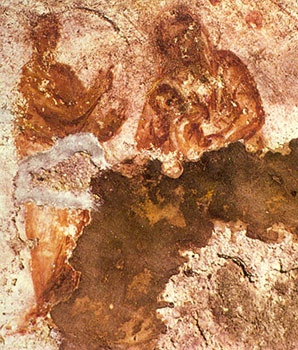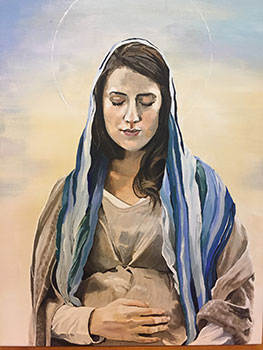
When we were expecting our fourth child, my husband and I were settled on a boy’s name, but there was debate about what we might name a girl. The more names I proposed, the more adamant my husband was about calling her Mary. The reason I gave him for not being keen on Mary was that it sounded plain and boring – apologies to anyone named Mary who is reading this article! The truth is, I was still harbouring some anti-Mary sentiment from my past.
During my late teens and early 20s, some of my closest friends were Protestants. I was part of their youth group and really enjoyed going on camps with them. I was often the only practising Catholic at these gatherings and regularly copped a bit of ribbing about the various things Catholics believe. Mary was a favourite topic of theirs. Maybe I was naïve, but I really couldn’t see what all the fuss was about. Mary actually hadn’t featured a lot in my spirituality. I had Rosary beads, but we didn’t say the Rosary. And the only statue of Mary in our home was a beautiful wall hanging that my Godmother had given to me for my First Communion. Personally, I had no problems with Mary. She was the mother of Jesus, and to my mind there had to be something special about that.
Their commentary didn’t cease though. “You Catholics worship Mary, instead of Jesus.” “There’s nothing about Mary’s importance in the Bible.” “Why do you ask Mary to pray for you, instead of going straight to Jesus?” And so the criticisms flowed. Sadly, I didn’t have the answers back then. And I came to accept their belief: Catholics have an unhealthy view of Mary.
Things have changed since then. Maybe it was the embarrassment of not being able to articulate the truth about Catholics’ relationship with Mary that has encouraged me to learn more about her role in Catholic theology and spirituality.
Through my husband’s love of the Rosary, I have come to appreciate that this meditative prayer helps us to reflect on many important passages from the Scriptures. Asking family and friends to pray to God for my intentions seems very natural, so why wouldn’t I ask Mary to pray to God for the intentions of my heart? One of the most revealing experiences I had on the subject of Mary was several years ago when I was fortunate enough to visit the catacombs in Rome. Before me was a depiction of Mary with the baby Jesus in her arms. I was mesmerised – not by the beauty, but it dawned on me that the very first Christians honoured Mary because of her role in bringing the incarnate God, Jesus, into our world. That was enough for me. I was over my Marian phobia!
By the way, I still remain friends with the Protestants from my youth. And our fourth child was a boy: Tom.
Food for the Journey
 Mary, by Nicole Vienneau
Mary, by Nicole VienneauFor your spiritual nourishment this month, I’d like to point you to a couple of Scripture passages that relate to Mary and have become the source of two prayers that are well-known to Catholics.
The first prayer, the Hail Mary, is taken from the first chapter of Luke’s Gospel. I encourage you to take a look at this Scripture and you will discover how most of the phrases of the prayer have been lifted straight from the Biblical text.
Hail Mary, full of grace.
The Lord is with thee.
Blessed art thou among women,
and blessed is the fruit of thy womb,
Jesus.
Holy Mary, Mother of God,
pray for us sinners,
now and at the hour of our death.
Amen
The second prayer, the Magnificat, comes directly from Luke 1:46-55 and it is one that I particularly love because the words have been put to music numerous times.
And Mary said,
“My soul magnifies the Lord,
and my spirit rejoices in God my Saviour,
for he has looked on the humble estate of his servant.
For behold, from now on all generations will call me blessed;
for he who is mighty has done great things for me,
and holy is his name.
And his mercy is for those who fear him
from generation to generation.
He has shown strength with his arm;
he has scattered the proud in the thoughts of their hearts;
he has brought down the mighty from their thrones
and exalted those of humble estate;
he has filled the hungry with good things,
and the rich he has sent away empty.
He has helped his servant Israel,
in remembrance of his mercy,
as he spoke to our fathers,
to Abraham and to his offspring forever.”
If you wish to know more about Mary’s role in the life of the Catholic tradition, then here are some resources you might find helpful.
- Jesus and the Jewish Roots of Mary by Brant Pitre, October 2018.
- Hail, Holy Queen: The Mother of God in the Word of God by Scott Hahn, 2006.
- The Burrowshire Podcast, episode #14, The Blessed Virgin Mary.
- Catechism of the Catholic Church
- Music: Magnificat, Stephen Kirk
Images: Mary and child, Catacomb of Priscilla, Rome, Wikimedia Commons
Mary, by Nicole Vienneau
This article is part of Faith Journey, a newsletter from the National Centre for Evangelisation.



